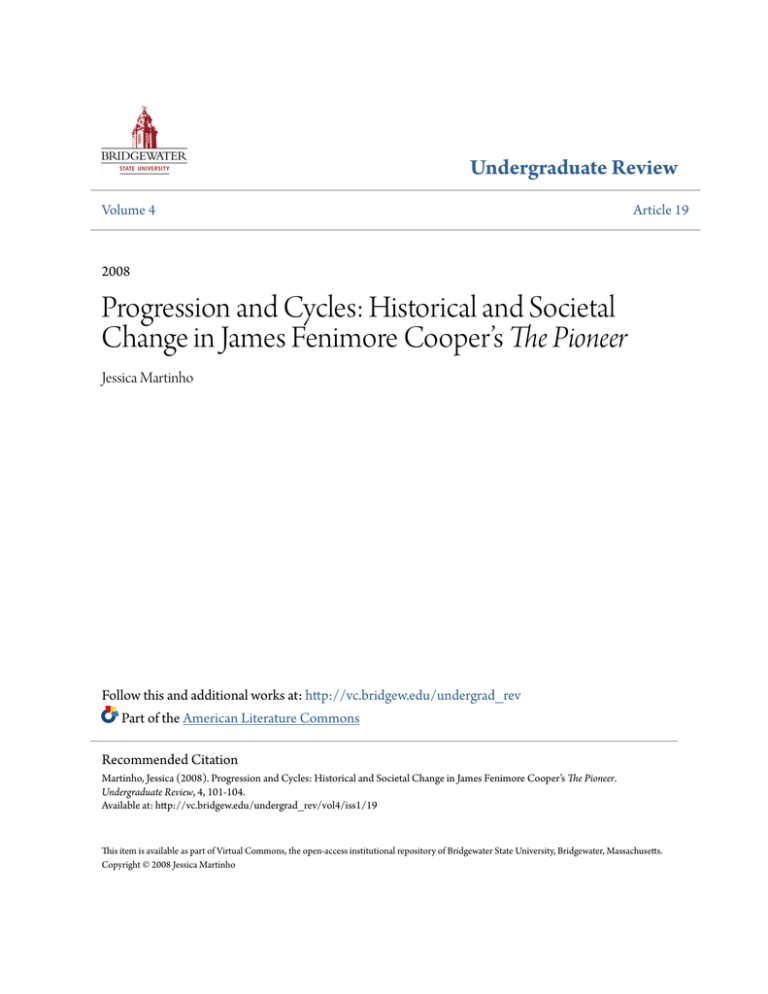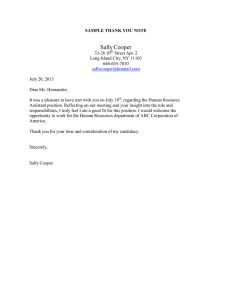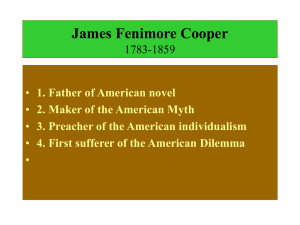Progression and Cycles: Historical and Societal Change in James
advertisement

Undergraduate Review Volume 4 Article 19 2008 Progression and Cycles: Historical and Societal Change in James Fenimore Cooper’s The Pioneer Jessica Martinho Follow this and additional works at: http://vc.bridgew.edu/undergrad_rev Part of the American Literature Commons Recommended Citation Martinho, Jessica (2008). Progression and Cycles: Historical and Societal Change in James Fenimore Cooper’s The Pioneer. Undergraduate Review, 4, 101-104. Available at: http://vc.bridgew.edu/undergrad_rev/vol4/iss1/19 This item is available as part of Virtual Commons, the open-access institutional repository of Bridgewater State University, Bridgewater, Massachusetts. Copyright © 2008 Jessica Martinho 101 Progression and Cycles: Historical and Societal Change in James Fenimore Cooper’s, The Pioneer Jessica Martinho Jessica is a senior majoring in English. She wrote this piece under the mentorship of Dr Ann Brunjes and presented it at the National Conference on Undergraduate Research at Dominican University in California(NCUR ’07). A s the European Enlightenment swept across the Atlantic Ocean, a great change took place in the nation, a change that turned American eyes from the heavens to the earth and forced men to look not to God, but to themselves for answers. As Robert A. Ferguson summarizes in his article on the American Enlightenment, “The Enlightenment in America is sometimes conveyed in a single phrase, the political right of self-determination realized” (368). As this statement suggests, the Enlightenment symbolized a newfound reliance on the self and man’s ability to reason as a means for the progression of both the individual and the nation as a whole. This self-determination and reliance upon method and reason, however, was often found to be problematic, for a reliance upon man requires that man be infallible, and as many people found, this requirement could not be met. One of the texts that explores this conundrum is James Fenimore Cooper’s The Pioneers. In the novel, Cooper presents his readers with a very bleak outlook on America’s future and warns that if it continues to follow its current path dominated by a reliance upon reason, American culture will use up all of its resources and dwindle to nothing. Throughout the novel, Cooper demonstrates a great anxiety over land consumption and attempts to warn readers that resources are quickly dwindling. Coupled with the fear of land exploitation is Cooper’s lack of faith in man’s ability to govern and litigate such an issue. Cooper’s trepidation surrounding law and man’s ability to successfully create, uphold, and enforce laws is another anti-Enlightenment theme that permeates the text. Despite these apparent anti-Enlightenment sentiments, a closer reading of both The Pioneers and Robert Ferguson’s article on the American Enlightenment is required in order to fully appreciate Cooper’s complex relationship with the Enlightenment. Ferguson’s article suggests that American progress, in all its forms, was a constant tug-of-war between two extremes, never a steady rise. This idea that American progress is not linear hearkens back to The Pioneers, for in the novel, Cooper illustrates a constant flux between progress and decline through the many cycles he employs throughout the novel. The Pioneers, although it seems to present the reader with a bleak outlook on the achievement of American progress, essentially gives hope to the reader, by showing that dark times will eventually give way to lighter ones, and that one day, through a series of these cycles, America will become a better nation. B R I D G E WAT E R S TAT E C O L L E G E 102 First, in order to explore Cooper’s complex relationship with Enlightenment thinking, it’s important to explore his trepidation surrounding man’s ability to reason. One of the most striking themes explored by Cooper in The Pioneers that expresses this fear is the theme of land exploitation and conservation. A prime example of this tension between consumption and waste is seen in the character of Judge Temple. Throughout the novel, Judge Temple constantly tells the settlers that they need to decrease their excessive uses of the land. Temple tries to set the precedent for his followers by not allowing the use of maple wood in his home. This is not very effective, however, because the Judge has little to no control over his people or his household. At the same time, Cooper highlights the hypocrisy in Temple, for although he talks about land conservation, Temple never actually enforces it and actually practices the opposite. This hypocrisy is exemplified in the dinner scene, for right before Temple begins to preach about the excessive felling of trees, the narrator gives a page-long description of the various dishes served at the table, showing that although Temple talks about conservation, he is placed in the very seat of opulence and excess. Judge Temple’s character is doubly important because he is not only the vocal warning against land exploitation but demonstrates a susceptibility to this kind of excess through his inability to establish laws prohibiting it and also in his inability to govern his own opulence. Cooper further bolsters Judge Temple’s bleak view of progress by providing an abrasive foil to his character. Richard Jones, though Temple’s friend and relative, is always at odds with Temple’s views on progress and nature. When Temple admonishes Richard for using maple wood in his house, Richard replies, “Poh! Poh! cousin ‘duke, there are trees enough for us all, and some to spare. Why I can hardly tell which way the wind blows, when I’m out in the clearings, they are so thick and so tall” (109). Richard’s beliefs, unlike Temple’s, are based on immediate observations and tangible results. Richard bases his beliefs on what he can see, taste, and touch, not in what might be in the future. These kinds of observations are representative of Enlightenment thinking in that they focus on man’s fallible reason and perception. While Judge Temple is a passive advocate for land conservation and Richard Jones is an active advocate for land exploitation, Natty Bumppo demonstrates temperance between the two. Throughout the novel, Natty pleads for people to only take what they need from the land. For example, in the scene in which the men are hunting pigeons, Natty says of their excessive killing, “It’s much better to kill only such as you want, without wasting our powder and lead, than to be firing into God’s creaters in this wicked manner […] for I don’t relish to see these wasty ways that you are all practysing” (248). Here Natty voices an opinion of land T H E U N D E R G R A D U AT E R E V I E W consumption that Richard Jones cannot understand and Judge Temple cannot enforce. Natty represents an idealized relationship between man and the land, where there is a balance between need and consumption, speaking against the “wasty ways” of the arrogant scientists and those who are too weak-willed to prohibit them. While land conservation is one of the main concerns of Cooper in The Pioneers, there is one other theme that is as equally significant and profound, and that is the complexity of creating and enforcing law. Throughout the novel, Cooper exhibits an anxiety surrounding law and man’s ability to create a law that satisfies the need of every man. In the novel, Cooper demonstrates how the law is weak and can easily be subverted, how the law can counteract a man’s better judgment, and how it unsuccessfully attempts to encapsulate the complexity of society by trying to express it with a limited language. As Charles Hansford Adams states in his study of Cooper’s relationship with law, “If America is to consummate its destiny as the land of apotheosis, where the individual consciousness, free of external restraints, can achieve the sublime integrity of Reason, the ‘shabby’ expedient of law must disappear” (13). Here Adams illustrates one of Cooper’s many grievances with American law: it is incapable of blanketing America with justice because it fails to adhere to the various systems of belief in different people, often enforcing the opposite of what is actually intended. Judge Temple, the head of law in Templeton, is a perfect example of Cooper’s lack of faith in systems of law. While the Judge wants to provide his people with a fair and just place to live, he is unable to enforce the laws that he seems to uphold. As previously mentioned, the Judge believes in a land where land consumption will be restricted, but not once does he successfully enforce this law within the town or even within his own household. This is one of the many arguments Cooper offers to the reader about law: even if the law is well-formed and backed with good intentions its enforcement relies upon a few individuals, in this case Judge Temple, who are fallible in that they may not have the capacity for imposing these laws on other men. The law is easily subverted without strong men to uphold them, and so the law system that Templeton is built upon is a shaky one. Another problem with the law Cooper presents in the novel is expressed once again by Adams: “[T]he law’s linguistic rigidity suggests also its extreme dependence on language. Its vocabulary may be limited, but its insistence on linguistic precision and specific usage reveals the extent to which the culture that threatens Natty is a verbal one” (Adams 62). Here Adams shows that not only is the law in The Pioneers imperfect in its enforcement and ideology, but also in the way it is expressed through a limited language. 103 In the courtroom scene the dangerous and sometimes ineffectual liaison of language further complicates the fragile relationship between the characters in the novel and law. As Adams stated, Natty Bumppo is the biggest victim of the language of law. As Mr. Van der School presents the jury with Natty’s second indictment, the narrator says of the indictment, “It accused the prisoner of resisting the execution of a search-warrant by force of arms, and particularized, in the vague language of law, among a variety of other weapons, the use of the rifle” (365). This “vague language of law” is at the heart of Natty’s confusion in the courtroom. The law of Templeton is linguistically confounded and fails to incorporate Natty’s Native American culture when it was crafted. To Natty and the rest of his kin, the laws of Templeton are confusing and do not apply because although they respect the laws, they feel it is crafted around a culture unlike theirs, setting up fences and restrictions in the middle of their everyday routines. For the most part, The Pioneers presents the reader with a very bleak view of America’s future. Despite this dark thread of uncertainty that pervades the text, there is an underlying current of hope for America, and that current of hope lies in Cooper’s use of cycles in the novel. Through cycles Cooper is able to express the give and take of progress discussed in Robert Ferguson’s essay on the American Enlightenment. At the very beginning of the novel, the narrator discusses Marmaduke’s acquisition of wealth. In this description, the narrator comments that wealth fluxes in a series of cycles, between wealth and poverty. In this cycle, emigrants struggle to make money only to have it squandered by their children; this then gives rise to a new generation that struggles to regain the family fortune. The novel starts with this theme of cycles to present the reader with a thread of hope among the other pessimistic themes. Here Cooper demonstrates that the accumulation of wealth, along with the many other forms of progress, is not linear, but cyclical. This fluctuation between two extremes ties to Ferguson’s essay on the American Enlightenment. Cooper’s use of cycles is not only found in his theories on economics, but he also demonstrates a struggle between two extremes in a more natural way through his description and incorporation of the different seasons. The first half of the novel takes place in the winter, which Cooper describes as a very whimsical time, matching his description of the snow with the very light action in the story. When spring arrives, however, there is a shift in the tone of the novel, for Cooper’s spring is not one of rebirth and rejuvenation, but rather a dull, gray spring that signifies the commencement of labor. Once again Cooper juxtaposes these two extremes as a means of demonstrating the circuitous path of progress. By using the seasons, one of the most common and well-known cycles, Cooper incorporates his story and his views on progress as part of a natural flux between two extremes. This focus on cycles is not atypical for American writers because it borrows from a philosophical theory that permeated the Enlightenment and one that many philosophers, including Georg Hegel, Emmanuel Kant, and Karl Marx, often drew upon: the theory of dialectical progression. Dialectical progression maps progress in a non-linear form and sets it upon a series of cycles going from what Hegel called a progression from thesis to antithesis and then to synthesis. Simply put, dialectical progression does with progress exactly what Cooper does in The Pioneers; it goes from one idea, like wealth, which gives rise to its exact opposite, poverty, and having learned from both extremes, the next cycle will have a new status of wealth which will then give rise to its exact opposite and perpetuate the cycle. Given this theory, Cooper’s attitude towards progression and the American Enlightenment become more positive. While he seems to fear for America’s future, he also offers the reader with hope by demonstrating that progress is not linear. Americans will struggle and fall just as often as they succeed. In this regard, Cooper supports the Enlightenment and believes that although man is imperfect and although an emphasis on reason is sometimes problematic, the dialectical progression of the nation will naturally lead imperfect men to progress. The Pioneers is at its core a complex novel that attempts to temper the many strong, radical ideas of the American Enlightenment. Cooper demonstrates how an emphasis on man and his reason can be problematic and shows how institutions like law and controlling land conservation are quite difficult given the fallibility of man. Despite these pessimistic views of the American Enlightenment, Cooper’s attitude towards it is not so simple, for underneath these pessimistic views is the belief that progress is not a linear notion but a process that occurs through cycles, dialectically progressing as America flexes between two extremes. Presenting the reader with a complex attitude towards the American Enlightenment, The Pioneers is both a realistic warning and a beacon of hope for the political, social, intellectual, and physical advancement of America. B R I D G E WAT E R S TAT E C O L L E G E 104 Works Cited Adams, Charles H. The Guardian of the Law: Authority and Identity in James Fenimore Cooper. PA: Pennsylvania State University Press, 1990. Cooper, James F. The Pioneers. New York, NY: Penguin Books, 1988. Ferguson, Robert A. “What is the Enlightenment? Some American Answers.” The Cambridge History of American Literature. Ed. Sacvan Bercovitch. New York, NY: Cambridge University Press, 1994. Kelly, William P. Plotting America’s Past: Feminore Cooper and the Leatherstocking Tales. Carbondale, IL: Southern Illinois University Press, 1983. Works Consulted Axelrad, Allan M. History and Utopia: A Study of the World View of James Fenimore Cooper. Norwood, PA: Norwood Editions, 1978 Blakemore, Steven. “’Without a cross’: the cultural significance of the sublime and beautiful in Cooper’s ‘The Last of the Mohicans’”. Nineteenth-Century Literature. 52.1 (1997): 27-57 Buchholz, Douglas. “Landownership and Representation of Social Conflict in The Pioneers.” James Fenimore Cooper: His Country and His Art. New York: SUNY, 1989. 94-102. Marshall, Ian. “Cooper’s ‘Course of Empire’: Mountains and the Rise and Fall of American Civilization in The Last of the Mohicans, The Spy, and The Pioneers.” The Pioneers.” James Fenimore Cooper: His Country and His Art. New York: SUNY, 1989. 55-66. Ringe, Donald A. James Fenimore Cooper. NY: Twayne Publishers Inc., 1962. Taylor, Alan. “The Great Change Begins: Settling the Forest of Central New York” New York History. 75.3 (1995): 265-290 Van Valen, Nelson. “James Fenimore Cooper and the Conservation Schism” New York History. 62.3 (1981):289-306 T H E U N D E R G R A D U AT E R E V I E W



